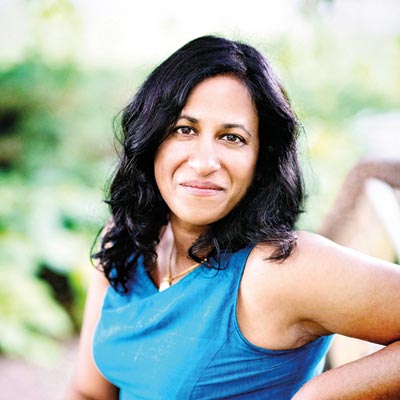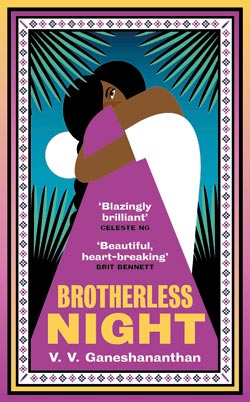Who’s afraid of Brotherless Night?

V.V. Ganeshananthan: "I wanted to be accountable". Pic by Sophia Mayrhofer
When I ask people if they have read Brotherless Night, V.V. Ganeshananthan’s stunning novel set in Jaffna during
Sri Lanka’s civil war, the answer is always the same: I want to. I really want to. I just can’t bring myself to.
And who can blame you? Thirty deafening years of war. Nearly fifteen years of an uneasy, rotten peace. And 300-something pages charting the insides of it all with surgical precision.
In the beginning of the novel, the protagonist and narrator Sashi invites us to understand why Brotherless Night is being written in the first place, both what and who it is about: “Let me tell you about dark men with white smiles, these Tamil men I loved and who belonged with me.”
It is a portrait of the ways in which we love those who belong to us, and who belong with us. It is a slow reckoning with how our belongings, during war, are snatched and stolen and spirited away. Yet it is also a story of how those absences, those brotherless nights, can fill up with other kinds of belonging, other kinds of love—love for strangers who quickly become family in the unfolding chaos of war; love for memories stored in secret places; love for the people we are forced to become in the face of tragedy after tragedy.
But beyond what and who the novel is about lies another, deeper dedication: who and what this novel is for. It is for us. For all of us who lived the war, whether we lived inside it or far away, whether we closed our eyes, or read the accounts, or lost family, or fled, or grew so hardened that we could no longer feel anything at all.
Earlier this month, Brotherless Night was shortlisted for the highly acclaimed Carol Shields Prize—a $150,000 award recognizing ‘excellence in fiction by women and non-binary writers’.
 It has also been shortlisted for the 2024 Women’s Prize for Fiction. Winners will be announced in mid-May and early June respectively but before that, I want you to read this book. Not because it’s brilliant but because it’s ours, and because it’s time. Fifteen years after the war’s end, in the absence of any real effort at collective grieving or reconciliation, think of this book as an invitation to begin that journey in the gentlest possible way.
It has also been shortlisted for the 2024 Women’s Prize for Fiction. Winners will be announced in mid-May and early June respectively but before that, I want you to read this book. Not because it’s brilliant but because it’s ours, and because it’s time. Fifteen years after the war’s end, in the absence of any real effort at collective grieving or reconciliation, think of this book as an invitation to begin that journey in the gentlest possible way.
- This book, from its title to the closing pages, is written in a tone of great tenderness. Where does that come from?
I really appreciate that reading of the book. I spoke to many people who endured this time period, and it was impossible, really, not to feel sympathy as I heard what they had gone through. Many of the people I spoke with were people I already knew and who were dear to me, and who became dearer to me as our conversations drew us closer together. When I did not already know the people I was interviewing, our exchanges often brought me to a place of deeper respect and understanding. It felt like both my obligation and my privilege to listen, to try to understand. If they were willing to talk, that was my end of the bargain, and I tried to fulfill it, which meant imagining as intensely and precisely and with as much attention as possible what it would have been like to be in their shoes. Sometimes that meant that I asked a lot of questions, and they were very patient about that.
Perhaps because of my diasporic positioning, I’m always looking for
Sri Lankans wherever I go. I’m hungry for their company—and in its absence, I am always imagining it. The circumstances of my life require me to seek out that history if I want to be in conversation with it, and when I speak to others about the events of their lives, especially events of this nature, they are giving me a certain kind of gift. That generosity builds respect and love for the stories and their tellers.
- You manage to capture, in ways that feel extremely real, the various intimacies of war. How it might have felt to be in closed, confined spaces—inside a community that is quickly becoming militarized; in a warzone with an army encircling. Inside a bomb shelter. Considering you didn’t physically live in Jaffna during that time, what did you draw on to understand that intimacy?
So, I mean, inside of a bomb shelter is a really good example. I had a lot of conversations with people about, how was a bunker built? Who would build a bunker? Who would pay for the bunker? What would the proportions of a bunker be? What was the experience of being inside a bunker like? I asked a number of people these questions. And Sashi’s description of being in a bunker during shelling comes from those conversations, and of course, from the intersection of those conversations with my imagination of who she in particular was.
- Aside from dealing with the urgencies of war, this book dwells a lot on the patience required to withstand a protracted conflict. It also took you over 16 years to research and write Brotherless Night. Did the writing of it always feel urgent to you? And how did you find the patience to work your way through a single project for over a decade?
- Your protagonist is a young medical student and an aspiring doctor. She also, partway through the war, becomes a kind of reporter, a keeper of stories. These two disciplines seem very distant from each other but in the book they become almost linked. Do you see writing as a kind of science, a way of practising healing, both for oneself and others?
And I think this is a really astute question that makes me think of my own work in a different way, which is really helpful. So thank you for that. I don’t know that I see writing exactly as a kind of science, and I have not consciously made catharsis my goal, but if it is an effect, then I think that’s good. Mostly, I am using my writing to ask questions, and I think that one of the things I have learned from doctors is that questions can have inconvenient, untidy answers, or no answers at all, and we still have to move forward. We might wish that a question had one answer, but often it has multiple answers, like a multifactorial diagnosis, someone who presents as sick, and one might wish that they had only one illness, but actually maybe they have three or four different things going on. That way of thinking, for me, certainly comes partially from being around a lot of practitioners of medicine. How can you make a choice that the clock requires with only limited knowledge, doing the best that you can?
- What has been your greatest joy in writing this book? What was one of your biggest fears about it?
My greatest joy in writing this book was simply that it was a way to be in conversation with a lot of people who care about Sri Lanka, which is endlessly interesting to me. I got to talk to all of these great, smart, thoughtful people, some of whom, of course, didn’t always agree with each other or with me, but all of whom were very kind when they spoke with me. And writing particularly about women, about civilians, about students, that was really meaningful to me. And I was able to see places I’d always wanted to see and talk to people I’d always wanted to talk to, and imagine myself in that history a little bit.
Once I understood what a large project it was, part of the way in, my fear was not finishing. And then beyond that, the question of establishing—to myself, most of all—my standing to write about this period of time. I was certainly aware, as I was working, that because I am someone who grew up outside of Sri Lanka, people might wonder what authority I had to write this material. So I began to ask: when people write historical fiction, how far in the past do we expect that history to be, and how do we expect people to connect to that history? If I had been working on a historical novel about Britain half a century ago, what kinds of questions would people have been asking me? I wanted to be accountable, but also not too tentative in my explorations, and I wanted to make sure to be as accurate as possible in the ways that mattered most, which is to say: how it felt to live then.
(Kanya D’Almeida is the winner of the 2021 Commonwealth Short Story Prize)
Searching for an ideal partner? Find your soul mate on Hitad.lk, Sri Lanka's favourite marriage proposals page. With Hitad.lk matrimonial advertisements you have access to thousands of ads from potential suitors who are looking for someone just like you.


